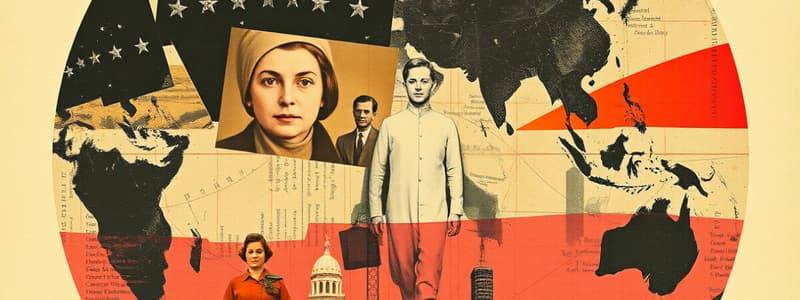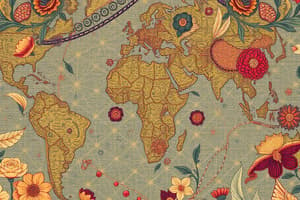Podcast
Questions and Answers
What is the primary purpose of the International Monetary Fund (IMF)?
What is the primary purpose of the International Monetary Fund (IMF)?
- To promote international military cooperation and stability
- To provide loans to private corporations globally
- To support international monetary cooperation and economic growth (correct)
- To oversee the global civil society organizations
Which of the following best defines Transnational Corporations?
Which of the following best defines Transnational Corporations?
- Businesses that provide services exclusively to non-profit organizations
- Corporations that operate only within their home country
- Firms focused solely on local markets
- Enterprises adding value through activities in multiple countries (correct)
What do International Financial Institutions (IFIs) typically require from governments in exchange for loans?
What do International Financial Institutions (IFIs) typically require from governments in exchange for loans?
- Termination of existing financial aid
- Complete governmental restructuring
- The implementation of specific policy changes (correct)
- Collaboration with local businesses only
Which group serves as an advisory organization discussing economic and political issues?
Which group serves as an advisory organization discussing economic and political issues?
What does Wallerstein's world-system theory emphasize?
What does Wallerstein's world-system theory emphasize?
What does economic globalization primarily involve?
What does economic globalization primarily involve?
Which of the following best describes the role of neoliberal principles in economic globalization?
Which of the following best describes the role of neoliberal principles in economic globalization?
Which organizations are identified as key non-state actors in promoting economic globalization?
Which organizations are identified as key non-state actors in promoting economic globalization?
How did earlier explorations and empires contribute to modern economic globalization?
How did earlier explorations and empires contribute to modern economic globalization?
What distinguishes modern economic globalization from earlier trade practices?
What distinguishes modern economic globalization from earlier trade practices?
Flashcards are hidden until you start studying
Study Notes
Introduction to Global Economy
- Globalization encompasses increased worldwide economic integration, creating interdependencies among nations.
- Economic globalization extends beyond internationalization, emphasizing integrated economic activities and the establishment of institutions for global market facilitation.
Economic Globalization
- Driven by heightened cross-border trade in goods and services, economic globalization is influenced by advancements in transportation and communication.
- Neoliberal principles promote market-driven activities with minimal government intervention, impacting global economic policies.
- Developed countries are pivotal in global industrial restructuring, while historical precedents include intercontinental trade routes of empires such as the Roman Empire and ancient Asian trade.
Actors of Economic Globalization
- Non-state actors like the IMF, World Bank, and OECD champion neoliberal policies and facilitate international trade discussions.
- Regional organizations (e.g., ASEAN, NAFTA) focus on enhancing trade cooperation; multinational companies (MNCs) are significant players in economic globalization.
- Central banks lead economic developments, while global civil society and Transnational Advocacy Networks (TAN) push for policy changes and alternative approaches.
International Monetary Fund (IMF)
- Comprises 183 member countries, aiming to promote international monetary cooperation, economic growth, and exchange stability.
- Provides short-term financial assistance to countries for balance of payments adjustments.
International Financial Institutions (IFIs)
- These institutions include development banks like the World Bank and monetary authorities such as the IMF.
- They offer loans for large-scale projects under specific conditions to stimulate economic growth.
Transnational Corporations (TNCs)
- Enterprises that engage in cross-border activities, enhancing value in multiple countries across sectors like manufacturing and services.
G8 and G20
- Advisory groups of nations that address current economic and political challenges, influencing national legislative regulations.
Global Civil Society
- Composed of individuals and groups impacted by globalization, advocating for alternatives and reforms within the global economy.
- Represents movements that seek to propose new world order frameworks.
Modern World System Theory
- Immanuel Wallerstein's theory categorizes the world economy into core states, peripheral areas, and semi-peripherals based on economic power and resource distribution.
- Peripheral countries are typically less developed, providing raw materials and labor for core economies, which dominate trade and wealth generation.
- Semi-peripheral nations possess some economic power but rely on core states for technology and investment.
Core Countries
- Wealthy, developed nations controlling trade and significantly influencing global economics.
- Generate high profits through the design and sale of advanced products, benefiting from rich research and development sectors.
Resource Distribution and Economic Hierarchy
- The modern world system illustrates the unequal distribution of wealth and resources, forming a hierarchical structure among nations, facilitated by modern transportation and communication advancements.
Studying That Suits You
Use AI to generate personalized quizzes and flashcards to suit your learning preferences.




